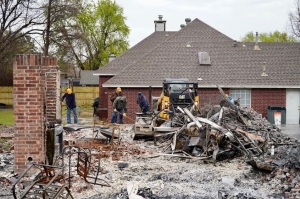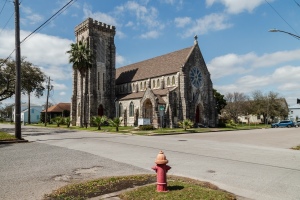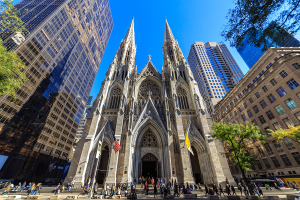Christians in a World of Trouble
Persecuted
Christianity came to Ethiopia in the fourth century and today about two-thirds of the population is Christian, but not everyone is happy about it.
In May 2011, Abraham Abera, a worker at an Evangelical church, was walking home with his pregnant wife, Bertukan. Suddenly, six Muslim men wielding machetes assailed them beating Abraham to death and leaving Bertukan unconscious. She and the baby survived and as Bertukan recounts the attack she recalls the men's words: "You [Christians] are growing in number in our area. You are spreading your message. We will destroy you."
In Russia, police with automatic weapons and attack dogs stormed St. George's Lutheran Church during Sunday morning worship. Blocking all exits, they announced that they were searching for "extremist literature" and proceeded to ransack Bibles and hymnals. Justifying the raid, the police commander said, "There were indications that terrorists were gathering there, and distributing terrorist literature." In fact, the raid was part of a growing program of hostility toward the Lutheran congregation that has been oddly branded "a Catholic sect."
These and far too many other stories are told by Paul Marshall, Lela Gilbert, and Nina Shea in their book Persecuted: The Global Assault on Christians.
"Our Christianity," they write, "doesn't require us to keep looking over our shoulders, unsure if we will be arrested for praying or attacked for having a Bible." But the majority of the world's 2.2 billion Christians do look over their shoulders. They have to.
Consider this horrific fact: "Christians are the single most widely persecuted group in the world today." The authors write, "This persecution is targeted at all Christian faith traditions from Roman Catholic, Orthodox, and Protestant to liturgical, evangelical, and charismatic, including hundreds of small, little-known sects."
The sources of persecution, write Marshall, Gilbert, and Shea, are threefold: Communist and post-Communist regimes that still "hunger for total political control"; Hindu and Buddhist nationalists who see Christianity as a political as well as a religious threat; and radical Islam with its "urge for religious dominance."
Across the world Christians are harassed, arrested, jailed, tortured, raped, beaten, and killed. Their churches and homes are bombed or burned to the ground. And children are taken from their Christian parents lest they too become tainted with faith in Jesus.
As I wrote in the Foreword to Persecuted, "we have been blessed with such a bounty of religious freedom that we can hardly imagine what such suffering must be like." But imagine it we must.
Persecuted is a hard book to read not because it's complicated, but because of the injustice, violence, and suffering running down every page. In some ways it hurts to read this book, but I recommend you read it nonetheless. Why?
Well first of all, it will strengthen your faith. The lives of those who witness to the truth of Christianity in the midst of unspeakable pressure are inspirational. Second, you'll understand the world better. This blood-spattered world is the world Jesus came to save and for which we need to pray. Third, it will prepare you to act. As Christians in America, we're in a position to put pressure on our government and in so doing come to the aid of our suffering brothers and sisters-and we must.
As Philadelphia Archbishop Charles Chaput writes in the book's Afterword, "Ignorance of the world is a luxury we cannot afford. We must know our faith, know our world and its struggles-and then open our hearts, engage our minds, and lift our hands."





























